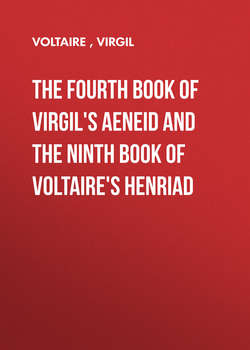Читать книгу The Fourth Book of Virgil's Aeneid and the Ninth Book of Voltaire's Henriad - Вольтер - Страница 3
THE FOURTH BOOK OF VIRGIL'S ÆNEID, TRANSLATED INTO ENGLISH VERSE
ОглавлениеWhile Dido, now with rising cares opprest,
Indulg'd the pain; the flame within her breast
In silence prey'd, and burn'd in every vein.
Fix'd in her heart, his voice, his form remain;
Still would her thought the Hero's fame retrace,
Her fancy feed upon his heav'nly race:
Care to her wearied frame gives no repose,
Her anxious night no balmy slumber knows;
And scarce the morn, in purple beams array'd,
Chas'd from the humid pole the ling'ring shade,
Her sister, fond companion of her thought,
Thus in the anguish of her soul she sought.
Dear Anna, tell me, why this broken rest?
What mean these boding thoughts? who is this guest,
This lovely stranger that adorns our court?
How great his mein! and what a godlike port!
It must be true, no idle voice of Fame,
From heav'n, I'm sure, such forms, such virtue came.
} Degenerate spirits are by fear betray'd,
} His soul, alas, what fortunes have essay'd;
} What feats of war!—and in what words convey'd!
Were it not fix'd, determin'd in my mind,
That me no more the nuptial tye shall bind,
Since Death deceiv'd the first fond flame I knew:
Were Hymen's rites less odious to my view,
To this one fault perhaps I might give way;
For must I own it? Anna since the day
Sicheus fell, (that day a brother's guilt,
A brother's blood upon our altars spilt);
He, none but he, my feelings could awake,
Or with one doubt my wav'ring bosom shake.
Yes! these are symptoms of my former flame;
But sooner thro' her very inmost frame,
May gaping Earth my sinking feet betray;
Jove's light'ning blast me from this vital ray
To Hell's pale shade, and Night's eternal reign,
Ere, sacred Honor, I thy rite profane.
Oh, no! to whom my virgin faith I gave,
"Twas his, and his remains within the grave".
She ceas'd—but down her bosom gush'd her tears.
"O dearer than the genial ray that cheers",
Her sister cry'd, shall lonely grief consume,
Lost to the joys of love your beauties bloom,
Lost to the joys, maternal feelings share?
Do shades for this, do buried ashes care?
That new in grief no lover should succeed,
Tyrians in vain, in vain Iarba plead;
That every chief of Afric's wide domain,
In triumphs proud, should learn to sue in vain;
'Twas well; but why a mutual flame withstand?
Can you forget who owns this hostile land?
Unconquer'd Getulans your walls surround,
The Syri untam'd, the wild Numidian bound.
Thro' the wide desert fierce Barceans roam:
Why need I mention from our former home,
The deadly war, a brother's threats prepare?
For me, I think, that Juno's fost'ring care,
Some god auspicious, rais'd the winds that bore
Those Phrygian vessels to our Lybian shore.
Their godlike chief should happy Dido wed,
How would her walls ascend, her empire spread?
Join'd by the arms of Troy, with such allies,
Think to what height will Punic glory rise.
Win but the gods, their sacred off'rings pay;
Detain your guest; invent some fond delay.
See low'ring tempests o'er the ocean ply,
The shatter'd vessels, the inclement sky».
Each word that dropt inflam'd her burning mind,
And all her wav'ring soul to love inclin'd;
New gleams of hope in Dido's bosom play,
And Honor's bright idea fades away.
Fain would the sisters now, by gift and pray'r,
With heav'n seduc'd, the conscious error share.
At ev'ry shrine, the fav'ring gods to gain,
In order due are proper victims slain;
To Ceres, Bacchus, and the God of Light,
And Juno most, who tends the nuptial rite.
